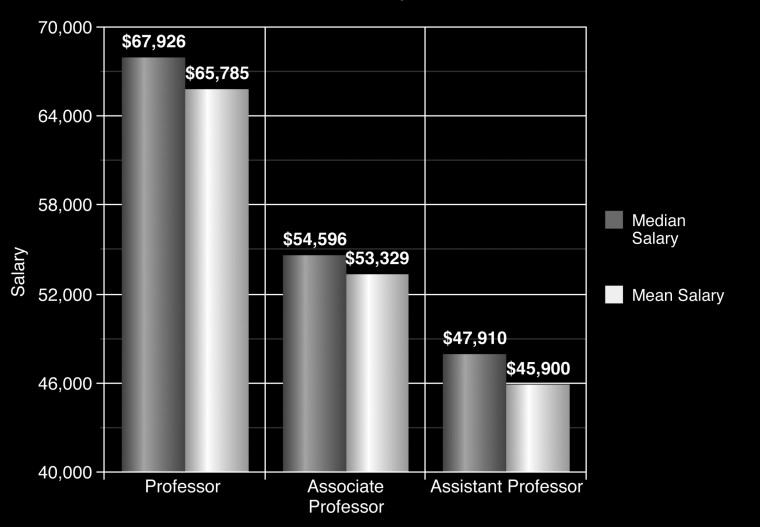Officials: Reasons For Pay Differences
November 4, 2010
The Office of Academic Affairs released mean and median faculty salaries at each rank on Thursday, Oct. 14, with the exception of administrators and librarians.
For professors, the mean salary is $67,926 with the median salary remaining lower at $65,785. Associate professors’ mean salary sits at $54,596, with the median at $53,329 while assistant professors’ mean salary sits at $47,910 with the median at $45,900.
While a substantial difference exists between the mean and median at each faculty title, this results from a group of faculty at the highest pay level driving the mean up.
“In doing an analysis of all the salaries and the variables, it was determined that the variables that most explain salary are length of service and the discipline,” Senior Vice President and Academic Dean Steve Griffith said. “In hiring, it’s often the case that in certain disciplines you have to pay more to get people in that discipline.”
These disciplines, often those in which potential faculty have marketable skill sets or the ability to make larger salaries, include areas such as business, accounting, computer science, and some sciences.
“If we hire (a person) at the assistant professor level in an area that has competitive market forces, that person is going to be paid more,” Griffith said.
Although professors in these disciplines may sit at a higher pay level, in many cases, these professors take significant pay cuts to come to Simpson.
“I came her after practicing law for a number of years and I took a very good salary cut,” Mark Juffernbruch said, chair of the department of business administration and economics and assistant professor of accounting. “I think I could go back into accounting or law tomorrow and be making more and I think that’s true for my colleagues in the department and probably for other disciplines as well.”
Still, even with salary cuts as a reality, Juffernbruch asserts that he prefers to be at Simpson.
“I like to share my excitement and passion with my students,” Juffernbruch said. “That’s a lot more fun for me to get up every day and do that than to sit in an office and prepare to try a case.”
On the opposite side, professors in the humanities are often faced with the unfortunate reality of lower salaries.
“It is true that people in some disciplines, if they went into the private sector, would probably be offered more money,” Nancy St. Clair, professor of English, said. “Students who graduate with a degree in accounting and become certified public accountant (CPA) will probably at pretty close to what I make after being here for 22 years.”
According to St. Clair, one large factor in keeping humanities professors’ salaries lower remains the huge numbers of people looking for jobs.
“It’s a buyers market,” St. Clair said. “The market for PHD’s in the humanities is horribly tight…I’m not as quick to recommend students go to graduate school as I used to be.”
This discrepancy in salary between disciplines is certainly present at Simpson; however, people at colleges and universities across the country see the same difference, and while some may view it as either fair or unfair, it will likely remain the same.
“It’s just the way the world works,” St. Clair said.





